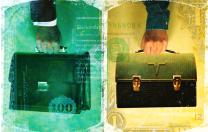Pforzheimer University Professor Sidney Verba says he used to joke that our politics are written in our genes. “I made the argument that the difference between a Republican and a Democrat was in their DNA,” he says. “Someday we’ll find that gene sequence.” That day may be drawing closer. Genetics met politics in research published last summer in the American Political Science Review, which suggests that people’s genetic makeup can predict whether they will have conservative or liberal views.
John Hibbing of the University of Nebraska, John R. Alford of Rice University, and Carolyn L. Funk of Virginia Commonwealth University examined data on 8,000 sets of twins, including personality and psychological tests. Using information about their opinions on 28 different political issues, they compared fraternal twins, who share half of their genes, with identical twins, who have the same genes. The researchers assumed that twins raised in the same home experienced a similar upbringing.
To estimate the influence of genes on a given attitude, the researchers subtracted the degree of agreement by identical twins from the degree of agreement by fraternal twins and doubled the difference. They found that genetic inheritance played a statistically significant role in all 28 issues, but opinions on school prayer and property taxes were the most powerfully influenced by genes. Both had a “heritability estimate ” of .41, while views on federal housing and liberals had estimates of .20 and .18, making them the least affected by DNA.
Although DNA appears to predispose people to react one way or another to certain issues, shaping their ideology, the researchers said party affiliation seems to depend more on the environment in which the twins were raised.
Verba is cautious about what this study reveals. “Untangling nature from nurture is very complicated, “ he says. “Pinning down any genetic basis of politics and separating it from how you were raised, and then connecting them to actual public policy or voting behavior has got a long way to go. But I can see more of this in the future.”








